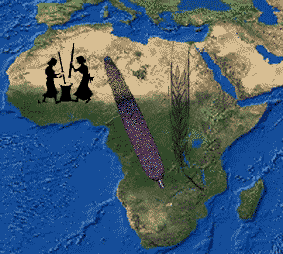|

|
 |

The Fifth International Workshop for African Archaeobotany will
be held 2-5 July, 2006
at the Institute of Archaeology,
University College London. For scheduled papers and absracts select days below.
|
The Fifth International Workshop for African Archaeobotany will
be held 2-5 July, 2006 |
|
|
Wednesday, 5 July, 2006 Session: Archaeobotany and political economy-- Tadmakka/Essouk – Medieval plant remains from the Malian Sahara Mary Anne Murray The settlement of Essouk was often cited in the works of Arab historians from the 9th century AD onwards as the major Trans-Saharan trade city of Tadmakka (meaning ‘this is Mecca’ in Berber). The settlement was the southern most Saharan staging post on the earliest known Trans-Saharan trade route to West Africa. The documentary evidence from the medieval period indicates that the southern Saharan trading sites were dominated at this time by the northern Islamic culture and that Tadmakka was the regional centre of Islam in this part of the Sahara though the Arab documents also indicate a more southern Berber strain of Islam at Tadmakka/Essouk. Essouk is located near Kidal, the capital of the Tuareg autonomous region which occupies most of the Malian Sahara. Early Arab records make an association between the ancestors of the Tuareg and the early occupants of Essouk. The Tuaregs themselves also consider it as their ancestral capital at the time of the arrival of Islam in the region. Despite the great importance of the ‘urban ruins’ of Essouk, this is the first major archaeological and archaeobotanical investigation of the site. The charred plant remains from the site include cotton (Gossypium), free threshing Triticum, millets (Pennesetum, Echinochloa), melon (Citrullus), Ziziphus, a variety of wild/weed plants, as well as animal dung presumably used as fuel. Together, the material culture and archaeobotanical evidence from the settlement are important for their potential to shed light on the development of Trans-Saharan trade, the early influence of Islam in the Malian Sahara and the possible origins of the Tuareg tribe. ... return to 5 July schedule |
|
Send mail to d.fuller@ucl.ac.uk with questions or
comments about this web site.
|